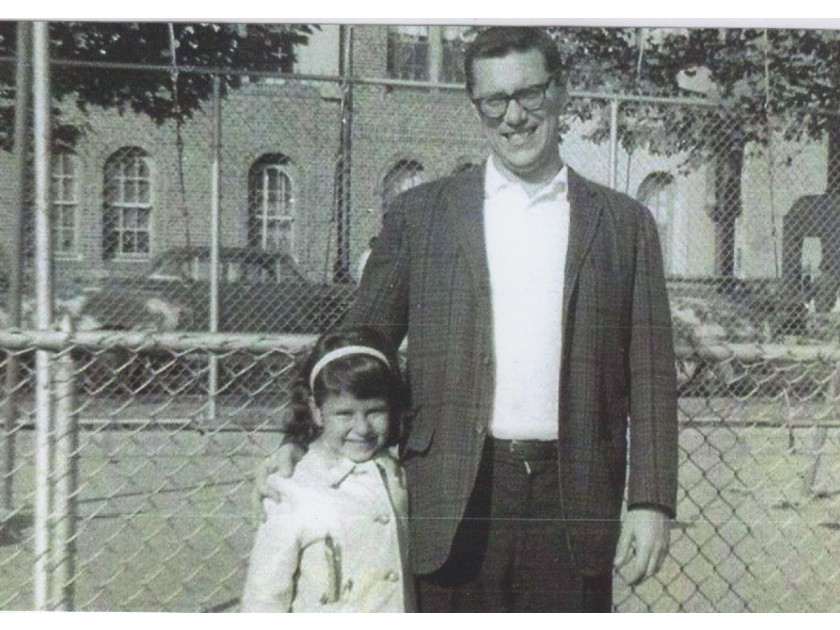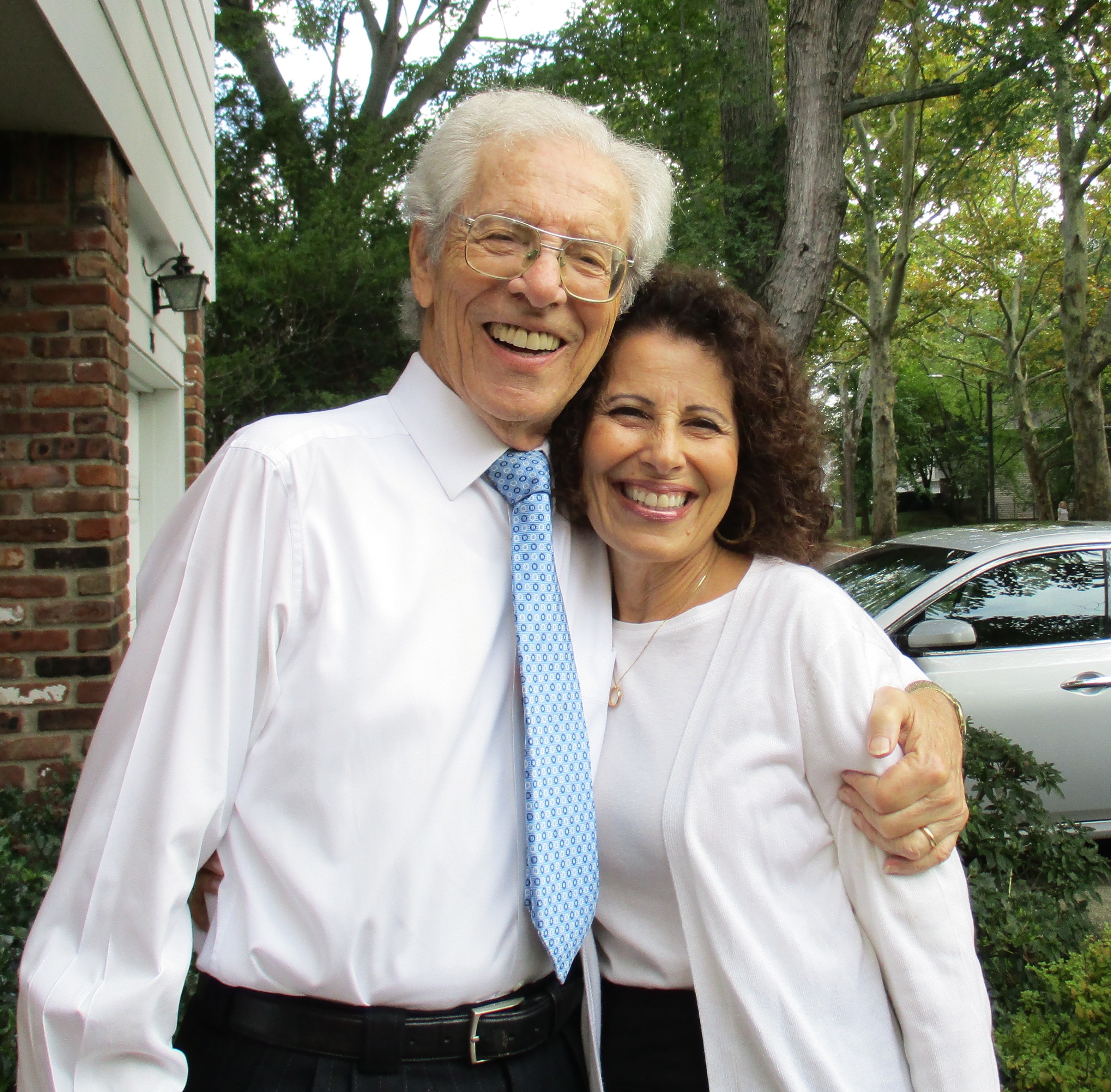
Lesléa Newman and her father in 1960s Brooklyn, courtesy of the author
“Writing these poems kept me alive.” That sentence was spoken decades ago by Paul Monette about his book, Love Alone, Eighteen Elegies for Rog, which was published in 1986. Rog was Roger Hurwitz, Monette’s partner who died of AIDS (as did Monette in 1995). I never forgot those words, and they came back to haunt me in 2017 when my perfectly healthy father unexpectedly and suddenly died. I had a bottomless howl of grief inside me that had to be let out before it ate me alive.
I know that losing a parent is expected; it’s the natural order of things. It is not akin to losing a partner, as I learned in 2012 when my mother died and I watched my father try, and largely fail, to cope with the loss of his wife of sixty-three years. Still, losing my father on top of losing my mother changed the landscape of my life completely.
In some ways, after my mother died, my father and I became partners. Instead of partners-in-crime, we became partners-in-grief. I stayed with my father for a few weeks right after he became a widower, supposedly because he had never lived alone and didn’t know how to cook a meal or do his laundry. But I could have hired someone to perform these tasks. The truth is, I needed my father as much as he needed me. My father and I needed to mourn my mother together. We needed to be fully in each other’s presence in order to fully experience her absence.
After a few weeks, I did hire a housekeeper so that I could return home, but my relationship with my father only intensified. One night soon after I’d left, he told me that one of the hardest things about living alone was there was no one there to ask him, “How was your day?” when he got home from work (my father kept his robust law practice going until he was eighty-eight). So every night for the next five years, I called my father at 7:30p.m. after Jeopardy to say, “Hi Dad. How was your day?”
As I wrote, I felt my father sitting beside me; I could see the smudged Clark Kent glasses resting on his face; I could hear him singing “Oh What a Beautiful Morning” in his off-key voice.
My dad and I lived two hundred fifty miles apart, so I couldn’t just drop by for lunch. Instead, I visited him for a long weekend every month. That went on for a few years until he had a series of mini-strokes and my visits became longer and more frequent, as I tried to ascertain what he needed and how to manage his care. Eventually he had to give up his law practice, give up playing tennis, give up driving, and give up the home he had lived in for fifty-three years. My dad absolutely hated moving to independent living. The day he moved in, as I helped him settle in, I asked, “Dad, what do you think?” He shrugged and said, “I don’t know. I’ll give it a year.” And then what? I wondered. I didn’t have a chance to ask. Always a man of his word, my dad died eleven months and twenty-seven days later. He was found in his room. No one could figure out what happened. I believe he died of a broken heart.
And now I was broken-hearted. I didn’t realize how completely my life had become bound up with my father’s until he was gone. A huge space opened up and the only way I knew how to fill it was to pick up my pen and write. I finally understood what Paul Monette meant when he said that writing the poems of Love Alone kept him alive. Writing the poems that became I Wish My Father kept me anchored to the earth. As I wrote, I felt my father sitting beside me; I could see the smudged Clark Kent glasses resting on his face; I could hear him singing “Oh What a Beautiful Morning” in his off-key voice; I could smell the Old Spice aftershave he slapped on his cheeks every morning before he headed off to work. I could hold onto him until I was ready to let him go.
In the Jewish tradition, one mourns the loss of a parent for eleven months, which is just the time it took me to write I Wish My Father, coincidentally — or perhaps not coincidentally — the same amount of time it took me to write I Carry My Mother after my mother died in 2012. Sharing my parents with the world through poetry is the best way I know to assuage my grief. It comforts me to think that when I read from the books to an audience, my parents are listening as well, smiling down from the world to come.

Courtesy of the author
WITHOUT WARNING MY FATHER
is sprung from the hospital early Friday
evening, seeming no better yet no worse
according to the doctor who dismisses
him with an indifferent wave of his hand
a little too eager to get on with his weekend.
My father refuses my offer of help
and gets dressed in slow motion, then insists
that I pack up a week’s worth of newspapers,
a half-empty box of tissues, a flimsy comb,
a toothbrush, and a kidney-shaped pink plastic
spittoon. Satisfied that he is leaving nothing
behind, he smiles and waves like royalty
as an aide pushes him past the nurse’s station
down the long hallway, into the groaning
elevator and out to the parking lot.
It’s not until we drive halfway home and stop
at a red light where a family of five crosses
the street — mother in long skirt, father in gray suit
with white sneakers gleaming on his feet,
children gussied up, subdued and somber—
that I realize it’s Yom Kippur
the holiest day of the year. “Gut yontiff,”
I say to my father, pointing. He stares
but does not wish me a good holiday
in return. When we arrive home, he heads
straight for his recliner and instantly falls
asleep, his mouth slack, his hands clasped
on top of his chest, his thumbs twitching
through his dreams. Darkness falls
an hour later and he startles awake,
looks around as if he has no idea
where he is, sees me, sighs, and says
“God will forgive us,” then dozes off
again. I tuck a green and black afghan
my mother knit a hundred years ago
under his chin, as I remember sitting
in synagogue with my father when I was
a little girl. How I loved braiding the tzit-tzit
of his tallils, the white fringe so smooth
and cool beneath my fingers, while the men
all around me swayed and prayed, their deep
voices wringing as much sweetness
and sadness out of those ancient words,
as they could, that heartrending minor key
comforting me like a soft shawl wrapped
around my small slender shoulders.
I stood when my father stood,
I bowed my head when my father
bowed his head, I sat when my father sat,
his “Amen” the sweetest and saddest
of them all. Last year for the first time,
we drove to services, my father unable
to manage the two mile walk between home
and shul. We sat up front hoping that would
help him hear, but after the third time
he asked, “What page? What page?”
licking his third finger and frantically flipping
through the prayer book like he was
looking for an important number
in an outdated phone book,
I was relieved when his head dropped
to his chin, then mortified once more
when he began to snore so loudly
the rabbi threw me a look and I took
my father home. I know God will
forgive my poor aged and aging
father for not attending temple
on this Day of Atonement
but I don’t know if the same God
will forgive me for not knowing
what’s best: to pray or not to pray
that the Book of Life be inscribed
at the start of the new year
with my father’s holy name
underneath my own
“Without Warning My Father” copyright ©2021 Lesléa Newman from I Wish My Father (Headmistress Press, Sequim, WA) Used by permission of the author.